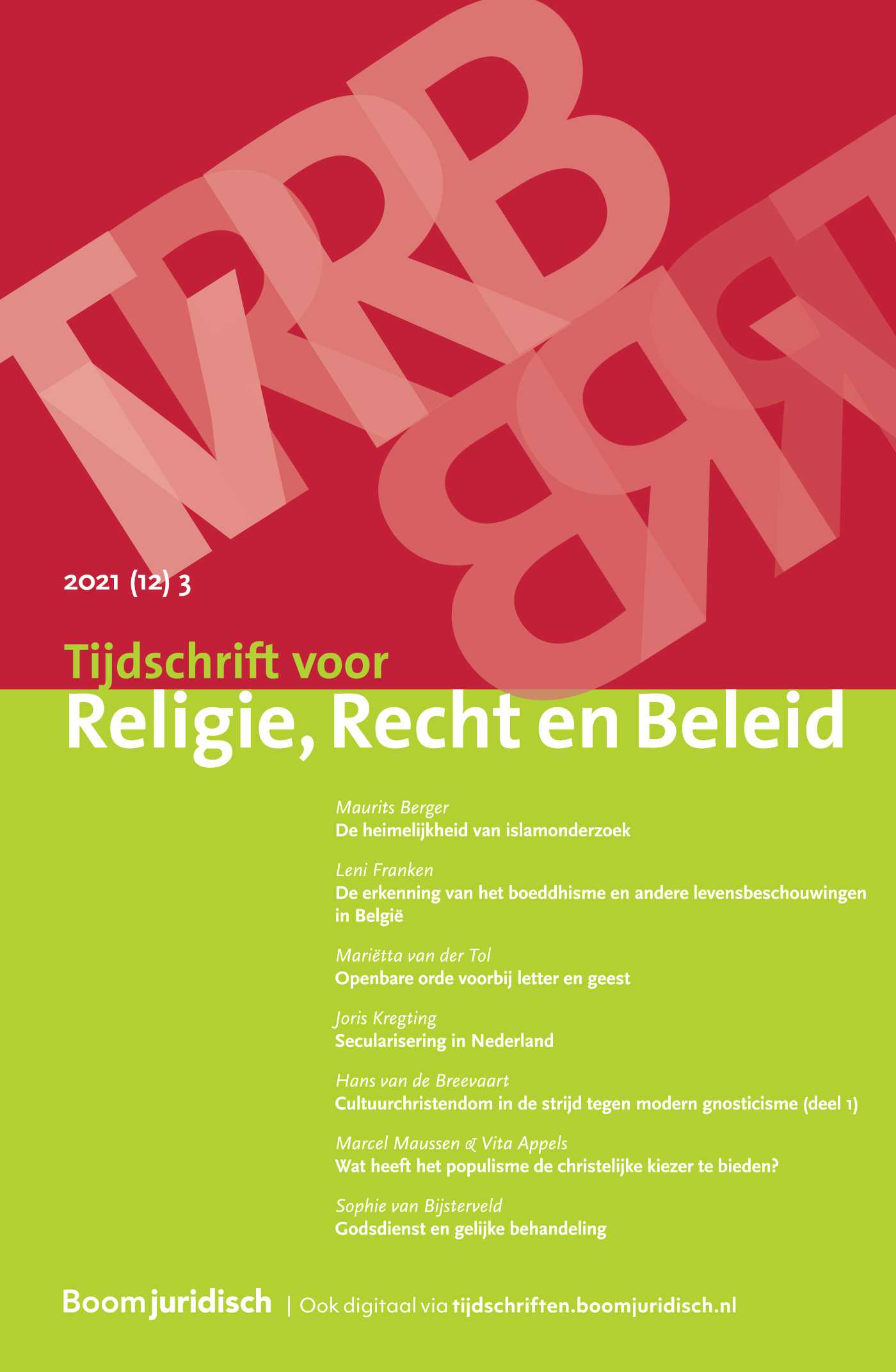|
It fits in with the objective of the oath that everybody is given the opportunity to swear an oath in compliance with his or her own faith. In The Netherlands this has already been legally possible since 1911. It is in agreement with the articles 1 and 6 of the Constitution and with tradition. After all, those who take the oath must fully realize the obligations they enter into. There is, however, some uncertainty about the scope and purport of the law of 1911. Therefore we are making three recommendations to clarify the rules. |


Tijdschrift voor Religie, Recht en Beleid
Meer op het gebied van Algemeen
Over dit tijdschriftMeld u zich hier aan voor de attendering op dit tijdschrift zodat u direct een mail ontvangt als er een nieuw digitaal nummer is verschenen en u de artikelen online kunt lezen.
| Diversen |
|
| Auteurs | Sophie van Bijsterveld |
| Auteursinformatie |
| Artikel |
|
| Trefwoorden | Eed, andere religies, belijdenisvrijheid |
| Auteurs | Jurn de Vries |
| SamenvattingAuteursinformatie |
| Artikel |
|
| Trefwoorden | Kerk en staat, beleidsmodel, pragmatisme, Nederland |
| Auteurs | Lars Nickolson |
| SamenvattingAuteursinformatie |
|
In the Netherlands, a national model for church-state relations is often put forward as the guiding light for authorities struggling with governance dilemmas related to religion. This model supposedly represents ‘The Dutch Way’ of dealing with religion and is, among other things, linked to multiculturalism, a pragmatic outlook, and typically Dutch historical processes like pillarization. This paper examines whether this model holds up in practice. It argues that the Dutch model does not suffice as an accurate description of current policy practices at the local level and that, given various underlying processes that influence this practice, this model also does not provide a credible normative guideline for the future. Dutch society has undergone significant changes, and the Dutch model should be rethought accordingly. |
| Artikel |
|
| Trefwoorden | Fadlallah, integratie, sjiisme, Nederland |
| Auteurs | Joseph Alagha, Huub Damoiseaux en Arnout van Ree |
| SamenvattingAuteursinformatie |
|
The authors endeavour to provide new insights on the continuing Dutch debate on ‘immigration’, ‘integration’, and the assumed clash between Islam and Dutch norms, values, and culture. The late Lebanese ayatollah Fadlallah (1935-2010) specifically addressed the Dutch situation in 2005-2010. The article is based on interviews with him, his Dutch followers, and literary sources. It demonstrates that Fadlallah and his followers hold liberal views on contentious issues such as women’s rights, veiling, integration, and condemn violence and terrorism as exemplified by 9/11. On these grounds, the authors question the supposed incompatibility between Islam and integration, arguing that the precepts of practice cast doubt on the validity of such a contention. |
| Artikel |
|
| Trefwoorden | religie, media, levensbeschouwelijke omroepen |
| Auteurs | Peter de Goede |
| SamenvattingAuteursinformatie |
|
The Netherlands public-service broadcasting system is confronted with an austerity policy of the present liberal-christian democrat minority cabinet, supported by the populist Party for Freedom. The Rutte cabinet also aims at scaling back the amount of large member-based broadcasting associations. Merger talks are now high on the agenda in Hilversum. Apart from the large member-based broadcasters a small amount of airtime is given to several broadcast organizations that represent the main religious or spiritual communities (catholic, protestant, jewish, buddhist, humanist, hindu, islamic). They are also involved in the merger talks. This article clarifies their present position in the Dutch broadcasting system under the Media Act. It is argued that they should integrate to form one, internally pluralist, task-based broadcaster for ‘higher things’, especially in order to stimulate religious encounters and dialogue. |
| Artikel |
|
| Trefwoorden | Binding kerk, staat, geschiedenis |
| Auteurs | Ben Koolen |
| SamenvattingAuteursinformatie |
|
This article sketches the historical development of the relationship between church and state up to the Napoleontic era. The church appears, never to be able to refrain from the patronage on its internal organisation by the monarchs. The development since the 19th century will be object of a sequel, with special attention to their position in the Kingdom of the Netherlands. |

 Aflevering 3
Aflevering 3